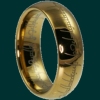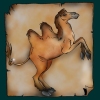Namnöversättning
| Tolkien (första förekomst) |
Åke Ohlmarks | Erik Andersson | Kamelen |
|---|---|---|---|
| Isengard (Bok II, kapitel 2: Elronds rådslag) |
Isengard, Isengård | Isengård | Isengård |
| Tolkiens översättningsguide | |||
| Isengard and Isenmouthe. These names were intended to represent translations into the Common Speech of the Elvish names Angrenost and Carach Angren, but ones made at so early a date that at the period of the tale they had become archaic in form and their original meanings were obscured. They can therefore be left unchanged, though translation (of one or both elements in either name) would be suitable, and I think desirable when the language of translation is Germanic, possessing related elements. Isen is an old variant form in English of iron; gard a Germanic word meaning 'enclosure', especially one round a dwelling or group of buildings; and mouthe a derivative of mouth, representing Old English mūtha (from mūth 'mouth') 'opening', especially used of the mouths of rivers, but also applied to other openings (not parts of a body). Isengard 'the Iron-court' was so called because of the great hardness of the stone in that place and especially in the central tower. The Isenmouthe was so called because of the great fence of pointed iron posts that closed the gap leading into Udûn, like teeth in jaws (see III 197, 209). In the Dutch and Swedish versions Isengard is left unchanged. For Isenmouthe the Dutch uses Isenmonde, translating or assimilating to Dutch only the second element (a more complete translation to Ijzermonde would seem to me better). The Swedish renders it Isensgap, which is incorrect, since Isen is not a proper name but adjectival. The gard element appears in Old Norse garðr, whence current or dialectal Swedish gård, Danish gaard, and English garth (beside the original English form yard); this, though usually of more lowly associations (as English farmyard), appears for instance in Old Norse Ás-garðr, now widely known as Asgard in mythology. The word was early lost in German, except in Old High German mittin- or mittil-gart (the inhabited lands of Men) = Old Norse mið-garðr, and Old English middan-geard: see Middle-earth. Would not this old element in German form -gart be suitable for a translation or assimilation to German such as Eisengart? Of -mouthe the German equivalent appears to be mündung (or in place-names -münde ); in Scandinavian, Danish munding, Swedish mynning. Note. Whatever form is used in Isengard must also be used in the name of the River Isen, since the river-name was derived from Isengard, in which it had its source. |
|||
| Kommentar | |||
| "Isen" har funnits som ett annat ord för järn även på svenska; det tycks ha varit ett tidigt tyskt låneord. (Så även på norska och danska, där man fortfarande använder ordet isenkram för såna varor som säljs i en järnaffär.) Ordet har, tycker jag, ungefär samma grad av svårförståelighet och gammaldags känsla på svenska som på engelska, så det får vara kvar. Både "Isengard" och "Isengård" tycker jag funkar på svenska. Att jag till slut fastnade för "-gård" är främst av två anledningar; dels för att det, trots att det ju är ett fullt modernt ord, kanske i såna här sammanhang leder tankarna till den vikingatida användningen av ordet i t ex "Miklagård", och på så vis ger den önskade ålderdomliga känslan; dels för att det därmed blir lättare att böja ordet när begreppet Isengarders skall översättas. Senast uppdaterad: 2014-10-20 23:38:39 |
|||
| Tolkien | Åke Ohlmarks |
|---|---|
| Isengard | Isengard, Isengård |
| Erik Andersson | Kamelen |
| Isengård | Isengård |
| Tolkiens översättningsguide | |
| Isengard and Isenmouthe. These names were intended to represent translations into the Common Speech of the Elvish names Angrenost and Carach Angren, but ones made at so early a date that at the period of the tale they had become archaic in form and their original meanings were obscured. They can therefore be left unchanged, though translation (of one or both elements in either name) would be suitable, and I think desirable when the language of translation is Germanic, possessing related elements. Isen is an old variant form in English of iron; gard a Germanic word meaning 'enclosure', especially one round a dwelling or group of buildings; and mouthe a derivative of mouth, representing Old English mūtha (from mūth 'mouth') 'opening', especially used of the mouths of rivers, but also applied to other openings (not parts of a body). Isengard 'the Iron-court' was so called because of the great hardness of the stone in that place and especially in the central tower. The Isenmouthe was so called because of the great fence of pointed iron posts that closed the gap leading into Udûn, like teeth in jaws (see III 197, 209). In the Dutch and Swedish versions Isengard is left unchanged. For Isenmouthe the Dutch uses Isenmonde, translating or assimilating to Dutch only the second element (a more complete translation to Ijzermonde would seem to me better). The Swedish renders it Isensgap, which is incorrect, since Isen is not a proper name but adjectival. The gard element appears in Old Norse garðr, whence current or dialectal Swedish gård, Danish gaard, and English garth (beside the original English form yard); this, though usually of more lowly associations (as English farmyard), appears for instance in Old Norse Ás-garðr, now widely known as Asgard in mythology. The word was early lost in German, except in Old High German mittin- or mittil-gart (the inhabited lands of Men) = Old Norse mið-garðr, and Old English middan-geard: see Middle-earth. Would not this old element in German form -gart be suitable for a translation or assimilation to German such as Eisengart? Of -mouthe the German equivalent appears to be mündung (or in place-names -münde ); in Scandinavian, Danish munding, Swedish mynning. Note. Whatever form is used in Isengard must also be used in the name of the River Isen, since the river-name was derived from Isengard, in which it had its source. |
|
| Kommentar | |
| "Isen" har funnits som ett annat ord för järn även på svenska; det tycks ha varit ett tidigt tyskt låneord. (Så även på norska och danska, där man fortfarande använder ordet isenkram för såna varor som säljs i en järnaffär.) Ordet har, tycker jag, ungefär samma grad av svårförståelighet och gammaldags känsla på svenska som på engelska, så det får vara kvar. Både "Isengard" och "Isengård" tycker jag funkar på svenska. Att jag till slut fastnade för "-gård" är främst av två anledningar; dels för att det, trots att det ju är ett fullt modernt ord, kanske i såna här sammanhang leder tankarna till den vikingatida användningen av ordet i t ex "Miklagård", och på så vis ger den önskade ålderdomliga känslan; dels för att det därmed blir lättare att böja ordet när begreppet Isengarders skall översättas. Senast uppdaterad: 2014-10-20 23:38:39 |
|



